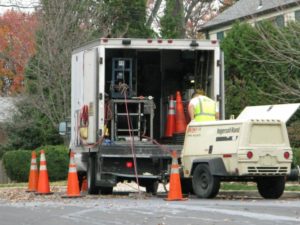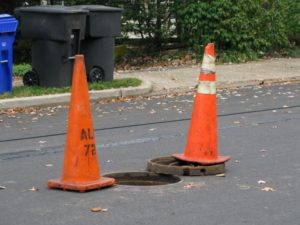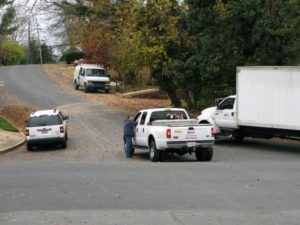 A pervasive chemical odor has prompted some residents in the neighborhood just north of the Washington Golf and Country Club and east of Glebe Road to call the fire department, thinking something was amiss, when in fact the odor is actually a byproduct of scheduled sewer work in the area.
A pervasive chemical odor has prompted some residents in the neighborhood just north of the Washington Golf and Country Club and east of Glebe Road to call the fire department, thinking something was amiss, when in fact the odor is actually a byproduct of scheduled sewer work in the area.
Contractors working for the county’s Water, Sewer and Streets Bureau are relining the sewer pipes along the 4700 block of 34th Road North until about 8:30 p.m. tonight. Water service has been cut to a number of homes in the area to facilitate the work, which is being done without any excavation.
The sewer bureau’s contractors using “a trenchless technology known as Cured-In-Place Pipe,” according to county Department of Environmental Services spokesperson Myllisa Kennedy.
The odor is the result of the styrene resin that’s used to reline the pipes. Kennedy says the resin “is not harmful to pets or people.”
Here’s how she explained the process:
The process involves inserting a resin-impregnated felt liner similar to a sock into an existing sanitary sewer main through the manhole. Once the liner is in place, hot water is injected into the sock, and the heated water activates the resin material which is impregnated in the liner. As the resin is activated, it cures and forms into a solid plastic material which transforms the flexible liner into a rigid pipe which exhibits structural strength equivalent to a new sewer. Additionally, the new cured pipe provides a smooth and efficient flow channel which thoroughly renews the sewer without excavating the pipe.
Once the pipe liner has cured, a robotic tool is inserted into the new pipe and is remotely directed through the pipe to cut out the lateral service connections, and the new pipe is placed back into service. The entire process typically requires 6-12 hours. The County’s Capital Improvement Program funds the relining program to replace approximately 1.5 percent of the sewer system annually, about 7 miles of pipe.
Similar work will be performed on the 4700 blocks of 34th Street and Dittmar Road between Nov. 29 and Dec. 3 next week. Sewer bureau staff will hand-deliver notices to affected homes.
Although the odor can be detected from the street, Kennedy says that residents can help prevent it from entering their homes by pouring water into each drain in the house. That helps to fill up a “sewer trap,” which prevents sewer odors from entering the home.



